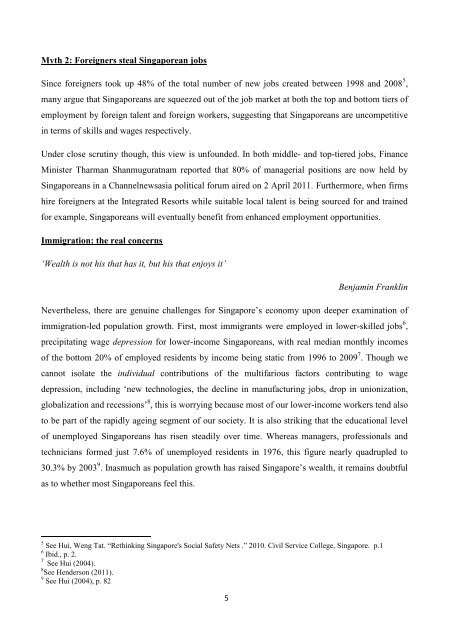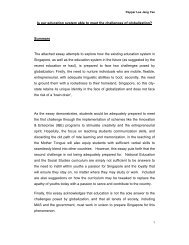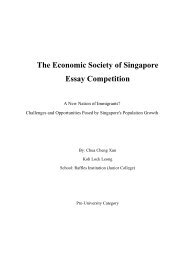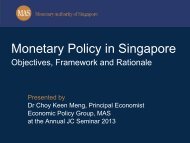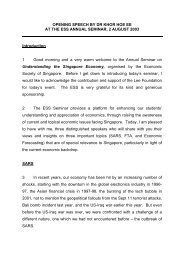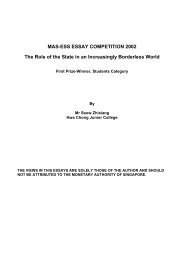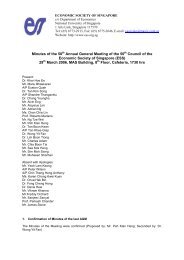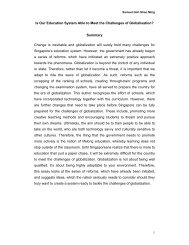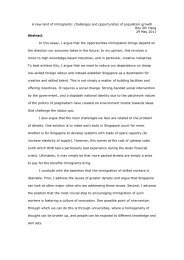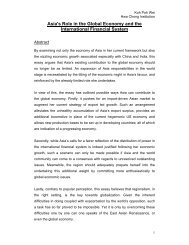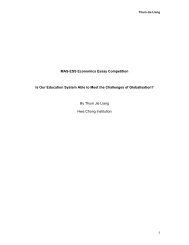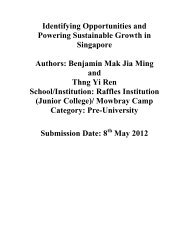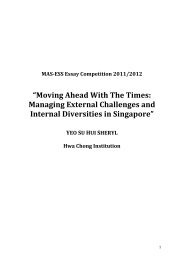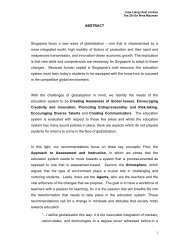Benjamin Mak and Thng Yi Ren - Economic Society of Singapore
Benjamin Mak and Thng Yi Ren - Economic Society of Singapore
Benjamin Mak and Thng Yi Ren - Economic Society of Singapore
- No tags were found...
Create successful ePaper yourself
Turn your PDF publications into a flip-book with our unique Google optimized e-Paper software.
Myth 2: Foreigners steal <strong>Singapore</strong>an jobs<br />
Since foreigners took up 48% <strong>of</strong> the total number <strong>of</strong> new jobs created between 1998 <strong>and</strong> 2008 5 ,<br />
many argue that <strong>Singapore</strong>ans are squeezed out <strong>of</strong> the job market at both the top <strong>and</strong> bottom tiers <strong>of</strong><br />
employment by foreign talent <strong>and</strong> foreign workers, suggesting that <strong>Singapore</strong>ans are uncompetitive<br />
in terms <strong>of</strong> skills <strong>and</strong> wages respectively.<br />
Under close scrutiny though, this view is unfounded. In both middle- <strong>and</strong> top-tiered jobs, Finance<br />
Minister Tharman Shanmuguratnam reported that 80% <strong>of</strong> managerial positions are now held by<br />
<strong>Singapore</strong>ans in a Channelnewsasia political forum aired on 2 April 2011. Furthermore, when firms<br />
hire foreigners at the Integrated Resorts while suitable local talent is being sourced for <strong>and</strong> trained<br />
for example, <strong>Singapore</strong>ans will eventually benefit from enhanced employment opportunities.<br />
Immigration: the real concerns<br />
‘Wealth is not his that has it, but his that enjoys it’<br />
<strong>Benjamin</strong> Franklin<br />
Nevertheless, there are genuine challenges for <strong>Singapore</strong>‟s economy upon deeper examination <strong>of</strong><br />
immigration-led population growth. First, most immigrants were employed in lower-skilled jobs 6 ,<br />
precipitating wage depression for lower-income <strong>Singapore</strong>ans, with real median monthly incomes<br />
<strong>of</strong> the bottom 20% <strong>of</strong> employed residents by income being static from 1996 to 2009 7 . Though we<br />
cannot isolate the individual contributions <strong>of</strong> the multifarious factors contributing to wage<br />
depression, including „new technologies, the decline in manufacturing jobs, drop in unionization,<br />
globalization <strong>and</strong> recessions‟ 8 , this is worrying because most <strong>of</strong> our lower-income workers tend also<br />
to be part <strong>of</strong> the rapidly ageing segment <strong>of</strong> our society. It is also striking that the educational level<br />
<strong>of</strong> unemployed <strong>Singapore</strong>ans has risen steadily over time. Whereas managers, pr<strong>of</strong>essionals <strong>and</strong><br />
technicians formed just 7.6% <strong>of</strong> unemployed residents in 1976, this figure nearly quadrupled to<br />
30.3% by 2003 9 . Inasmuch as population growth has raised <strong>Singapore</strong>‟s wealth, it remains doubtful<br />
as to whether most <strong>Singapore</strong>ans feel this.<br />
5 See Hui, Weng Tat. “Rethinking <strong>Singapore</strong>'s Social Safety Nets .” 2010. Civil Service College, <strong>Singapore</strong>. p.1<br />
6 Ibid., p. 2.<br />
7 See Hui (2004).<br />
8 See Henderson (2011).<br />
9 See Hui (2004), p. 82<br />
5


